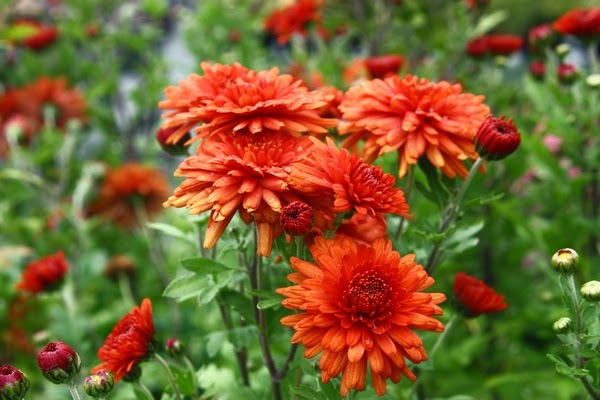I'd like to thank my family and friends...
Oh wait, this isn't a real award? Well I can't say I'm not disappointed. Do you know how difficult it is to get champagne back into the bottle and the cork back on..?!
 |
| Dendranthema 'Rosy Igloo' |
1 What tool couldn’t you live without (ok you probably could but humour me!)?
Simply my spade. It's a fairly ordinary tool really, metal where it needs to be and wooden elsewhere, but it's a tool that I enjoy using.
2 Do you ever listen to music when you work, if so what is your preference?
I'll listen to anything once! Most of the time I listen to more upbeat stuff, but as with gardening it's important to match intensity with calm, so I do have quieter stuff as well. I tend to pick and mix individual tracks, but when I'm driving (I almost never listen to music while I'm working) I listen to tracks from the mighty Bellowhead, AC/DC, Parov Stelar....
3 Cake of choice for tea time?
Fruit cake. Love a good fruit cake, but find them sadly scarce in summer, instead hidden in the shadows of flouncy sponge cakes. Bah! To be honest I've got to be in a particular mood for cake anyway, so can't say that tea with cake is a regular custom.
4 Favourite plant to grow from seed?
Circumstances mean that I don't sow many plants from seed at the moment, but I do enjoy the satisfaction of seeing seedlings emerge. I guess my favourite plant to grow from seed would be anything with rapid germination and a 100% success rate, but all to often the plants I grow are much slower and less predictable.
5 Is there a plant you don’t like?
Hmmm, probably not. My tastes are very diverse; I love all the antisocial plants that people reel away from, things with spines or bad smelling flowers. I guess there are plants that I wouldn't go out of my way to grow, like a lot of the bedding plants, but there aren't any that I have a strong dislike of.
 |
| Viburnum plicatum 'Popcorn'- definitely a plant I love! |
Not being there! You can't say that gardening jobs are all easy and straightforward, or even always pleasant, but you have to knuckle down and do them. There is a train of thought that says that it's doing the crap jobs that helps you appreciate the good jobs, in the same way that being out in the rain helps you appreciate the sunshine. I can put up with a lot of hardships but the worst would be being away from plants and open spaces.
7 To lawn or not to lawn, that is the question?
Lawn, definitely. I love narrow paths, intimate spaces and the feeling of being overwhelmed by plants, but I've come to appreciate the importance of a quiet, open space to counter the intensity of exuberant planting. There are also practical issues; some plants can only be appreciated if you step back from them, like trees, shrubs with upward facing flowers and, strangely, short plants at your feet. A sense of space is important, and a lawn provides a soft and neutral open space in which to enjoy your plants. In a tiny garden though this goes out of the window! In a tiny garden I would lose the lawn straight away, but design and plant in such a way that access routes are comfortable or generous, and plan in such away that (at least in some parts of the garden) plants weren't able to form dense thickets, thus allowing a sense of space and openness without a lawn.
8 What is the best time of the day?
Morning. Nice, cool mornings, when the world hasn't really got going yet and it's just you, the garden and the wildlife.
9 What gardening “rules” do you break on a regular basis?
Most of them! In the South West we have to break the rules- the mild climate means that the grass tends to grow all year round, so needs mowing in winter even if it is wet. Hard and fast gardening rules espoused by TV gardeners, magazines and even the RHS annoy me. Every garden is different, and wherever you are in the UK you will quickly learn that planting your vegetable plants out when the media says is either too early or too late! Scotland can be 3 weeks behind Cornwall and Devon, and will see cooler temperatures quite a lot earlier than the mild South West. I can appreciate that people giving generalised advice to the whole UK will have to advise using a happy medium, but the fact is that we have a lot of different climates to deal with. You must garden for your own garden, your own climate and region, even if that means breaking the rules.
10 What do you prefer, cold and dry or warm and wet?
Cold and dry- much easier to work in! That said, I think many if not most of my plants, especially those with big leaves, would prefer their rainfall.
11 What other hobbies, not horticulturally related, do you have?
I do enjoy photography, although I tend you use my camera to take pictures of plants and gardens so I don't know if this classes and completely non-horticultural. I love to take my camera out, but wouldn't compare myself to the 'proper' photographers out there.
Have we finished now?
